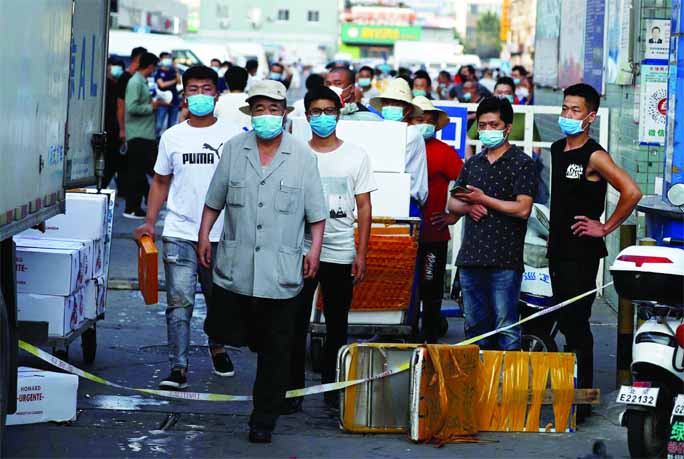
Reuters, Beijing :
A Beijing district put itself on a “wartime” footing and the capital banned tourism and sports events on Saturday after a cluster of novel coronavirus infections centred around a major wholesale market sparked fears of a new wave of COVID-19.
Forty-five people out of 517 tested with throat swabs at the Xinfadi market in the city’s southwestern Fengtai district had tested positive for the coronavirus, Chu Junwei, a district official, told a briefing.
None were showing symptoms of COVID-19, he said, but added that 11 neighbourhoods in the vicinity of the market, which claims to be the largest agricultural wholesale market in Asia, had been locked down with 24-hour guards put in place.
“In accordance with the principle of putting the safety of the masses and health first, we have adopted lockdown measures for the Xinfadi market and surrounding neighbourhoods,” Chu said.
The district is in a “wartime emergency mode,” he added.
The closure of the market and new restrictions come as concerns grow about a second wave of the pandemic, which has infected more than 7.66 million people worldwide and killed more than 420,000.
They also underline how even in countries which have had great success in curbing the spread of the virus, clusters can sometimes easily arise.
The entire Xinfadi market was shut down at 3 a.m. on Saturday (1900 GMT on Friday), after two men working at a meat research centre who had recently visited the market were reported to have the virus. It was not immediately clear how they had been infected.
On Saturday, market entrances were blocked and police stood guard. Beijing authorities had earlier halted beef and mutton trading at the market and had closed other wholesale markets around the city.
They plan for more than 10,000 people at the Xinfadi market to take nucleic acid tests to detect coronavirus infections.
A Beijing district put itself on a “wartime” footing and the capital banned tourism and sports events on Saturday after a cluster of novel coronavirus infections centred around a major wholesale market sparked fears of a new wave of COVID-19.
Forty-five people out of 517 tested with throat swabs at the Xinfadi market in the city’s southwestern Fengtai district had tested positive for the coronavirus, Chu Junwei, a district official, told a briefing.
None were showing symptoms of COVID-19, he said, but added that 11 neighbourhoods in the vicinity of the market, which claims to be the largest agricultural wholesale market in Asia, had been locked down with 24-hour guards put in place.
“In accordance with the principle of putting the safety of the masses and health first, we have adopted lockdown measures for the Xinfadi market and surrounding neighbourhoods,” Chu said.
The district is in a “wartime emergency mode,” he added.
The closure of the market and new restrictions come as concerns grow about a second wave of the pandemic, which has infected more than 7.66 million people worldwide and killed more than 420,000.
They also underline how even in countries which have had great success in curbing the spread of the virus, clusters can sometimes easily arise.
The entire Xinfadi market was shut down at 3 a.m. on Saturday (1900 GMT on Friday), after two men working at a meat research centre who had recently visited the market were reported to have the virus. It was not immediately clear how they had been infected.
On Saturday, market entrances were blocked and police stood guard. Beijing authorities had earlier halted beef and mutton trading at the market and had closed other wholesale markets around the city.
They plan for more than 10,000 people at the Xinfadi market to take nucleic acid tests to detect coronavirus infections.

